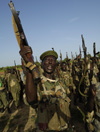
Don’t miss out on the insights from The New York Times’ Nicholas Kristof in his latest dispatch from Sudan. Here are a few key quotes and takeaways from this important piece:
- “[W]e should all try to pay more attention to the risk of a catastrophic war ahead in Sudan. Everybody knows it may be coming, but until the bullets start flying, it simply isn’t going to get the attention it merits… behind the scenes the real question is whether the north-south civil war is going to resume.”
- “The next north-south war, if there is one, will be extraordinarily ugly.”
- There are two main reasons to be optimistic (and to think that a return to N-S war could be avoided): The governments in Juba and Khartoum both have an interest in finding a mutually beneficially oil revenue sharing arrangement and “both sides are exhausted by war.” Plus: “The world is also much more attentive to Sudanese abuses, and there would be an immediate outcry if Khartoum unleashed militias on the south once more.”
- Reasons to be pessimistic: President Bashir has never kept his promises (particularly on the peace agreement front). There are several key issues that must be resolved between Bashir’s National Congress Party and the South’s ruling Sudan Peoples’ Liberation Movement before the South’s self-determination referendum. If they are not resolved, each of these discrete issues could justify another war for one side or the other. These issues include: the future of Abyei (and details involving its referendum), the demarcation of the North-South border, which slices through several oil-rich areas that both parties seek to lay claim to.
- In addition to these high-level political tensions, add to the mix intra-southern tribal tensions and long-standing grievances between Arab nomadic populations and southern pastoral groups coexisting near Sudan’s contested internal border. An anecdote from Kristof helps to explain how extremely localized disputes frequently magnify into deadly serious incidents.
Kristof concludes that while a new war in Sudan isn’t inevitable after next year’s southern referendum, “it’s a real risk.” He argues that the U.S. and other countries who played a crucial role in the signing of the North-South peace deal in 2005 can’t look away now. Kristof also suggests that the U.S. should consider messaging to Khartoum that it will provide military support to the southern army if Khartoum opts to resume air strikes à la Darfur and the previous North-South civil war. While military assistance is obviously controversial, it is clear that the administration needs to make absolutely clear to Khartoum that there are some redlines it is unwilling to accept in terms of the government’s behavior on the ground. The U.S. needs to be very focused on planning for numerous possibilities and eventualities for the very rapidly approaching post-referendum Sudan.
Finally Kristof encourages comments from his readers on this topic, particularly from Sudanese readers. More discussion and consideration of the risks in the run-up to the referendum is needed, and I for one will be checking the comments on this post to see the range of thoughts and ideas emerging during this critical moment in Sudan’s history.
Photo: SPLA soldiers in Abyei (IRIN)

